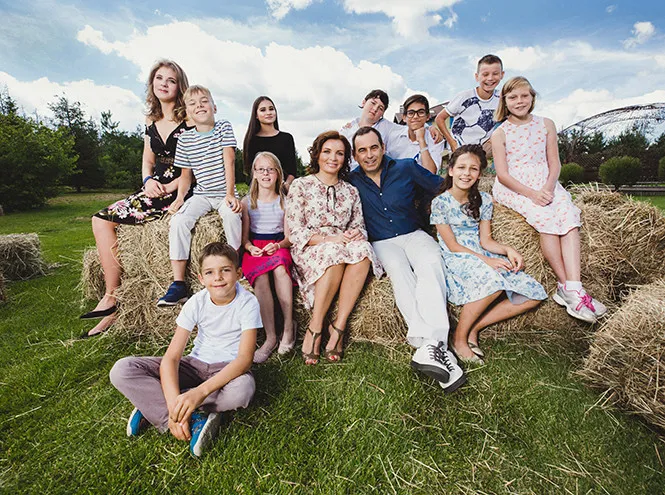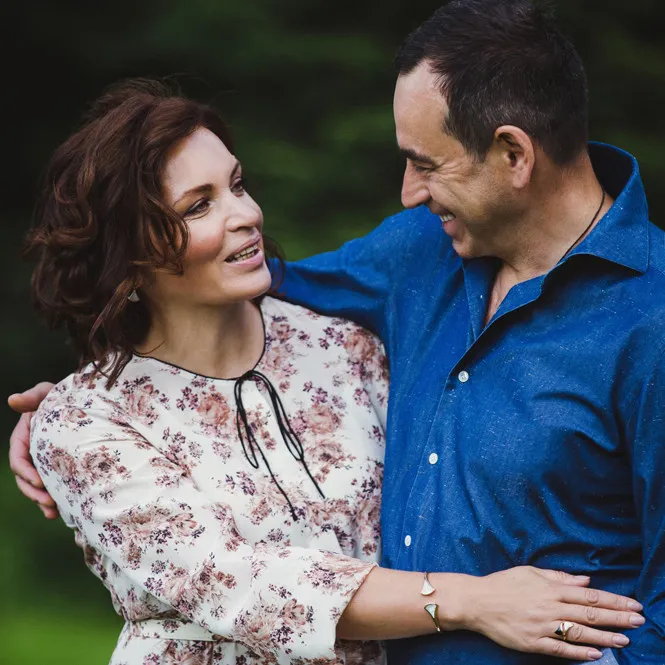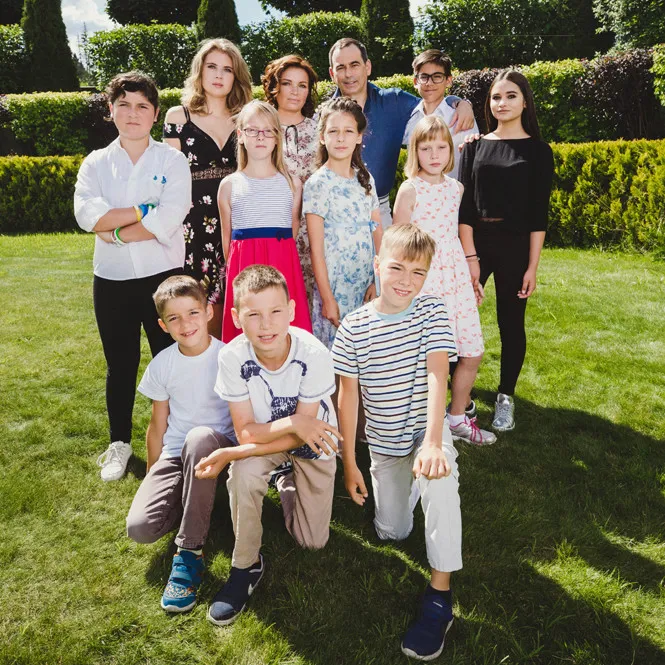

Roman Avdeev - how are our children raised?

Roman AVDEEV with his wife and children
Brilliant book is "Neznaika on the Moon". If you remember, he actually became homeless. Then he was taken to the island, where you could do anything but not work. Characters turned into lambs who gave wool. When I read this book in my childhood, it seemed to me that it was a real life. I do not want my or other children, figuratively speaking, to turn into lambs to give wool. How does the Nosov’s tale end? Everyone was happy that they were no longer fed and cared for. "Communism" ended, and they were allowed to live their own lives. I understood the depth of this image when I was an adult, thirty-five year old man.
Modern society, and especially children, are too focused on money. However, the emphasis should be shifted to respect for work and careful attitude to things. This is much more important.
Spending on children should be justified.
We do not rush to buy the latest model of gadgets and phones. A child needs to be introduced to gadgets, but at this age the phone may be needed only for calling the mother. Of course, I am forced to buy smartphones for older children, so that they do not feel like social outcasts, but in my opinion this is unnecessary. This is unjustified waste of money both for me and for them. When I buy a phone as a birthday present, I buy the latest model, of course. It would be weird to get an old model. The child gets the best. This is life.
For example, I had few toys in my childhood – my parents simply could not afford to buy much: it was different time and there was not much choice. Perhaps these toys are covered with legends and seem different in my memories, but I still remember and value them. They once bought me a construction set for 10 rubles in the "Children's World". I studied the details and pictures and got some ideas. I decided that I needed a second set to assemble a crane. My father explained: "It is irrational to buy a second set, because only one detail is missing. Let's make it together." He brought some piece of iron from work, we took a file and a drill and made this detail. We assembled the crane. I did not play with it much, but the very process of implementation was important. I came up with the idea, and my father helped me do it. The main thing is that we’ve done it. If they had bought me a second set back then, I would not remember this moment.
I'm very embarrassed with the very phrase "parents should". It all depends on possibilities: many parents cannot buy their child a car. This does not mean they are bad people. If there is a possibility, children need to be given other things: education, character building, and a good start. Talking about the car, I am ready to buy a child the first car – a car of a "very middle class" costing no more than 800 thous. rubles. I bought Zhiguli to my older children. "Zhiguli" does not fall from the sky either!
It is important to educate an economical and respectful attitude to things in children.
Negligent treatment spoils things. My wife and I do not rush to buy a replacement. Another example: one day we came to our country house, and it turned out that one of our sons forgot his change of clothes in Moscow. He washed his own clothes every evening the whole week. Children do not need to be protected from minor troubles, there is no need for greenhouse conditions or overparenting.
There are many children in our family. We repair things, and they pass from one to another. Of course, we also buy new ones. But this is how an economical or respectful attitude is formed. "Respectful" is the key word here. When children start their first grade, we start giving them pocket money. I would not do this – in my opinion, it’s too early, because a child has not yet formed their needs (the need for pocket money appears in older children, when they attend camps and go out with the class for excursions). But all parents give their children pocket money. For example, there are vending machines at schools, selling not very useful goods (I would prefer to remove them, by the way). This is reality, and we just go for a minimum amount that allows a child not to experience discomfort. Each of them treats money in their own way, depending on the psychotype. Some are saving up. Some are saving together to buy toys.
A child should like things you buy.
When we buy clothes for babies, it's silly to discuss anything with them – they cannot evaluate it. But as soon as they start realizing their desires, we start to take them into account. It is very important to listen to children and talk to them. We are discussing not the price, but the thing: whether it is needed or not, whether they like or dislike it. We provide arguments, saying: "Let's do this, because..." Of course, there are spontaneous reactions. One wanted to fly into space. So what? We are adults. We realize what we can and cannot do. We need to talk, convince, and explain. Why do we – adults – often disrespect children? Is a child an unreasonable creature? Of course, things should be nice and comfortable. But you should know where to draw the line. Parents often buy toys to amuse themselves, while their children actually do not need them at all.

Roman AVDEEV and his wife Elena raise 23 children, of whom 19 are foster children
I am against paying a child for good grades or behavior.
These are labor relationships within the family. I consider this approach wrong based on my background, traditions of my family and my wife's family. You can get a part-time job. It all depends on when a child is ready for it. For example, two children (they are 14 now) did an internship with a bank – they did a paperwork. They were paid a reasonable reward, they were able to dispose of it. I think this is an important experience. I cannot say that all our children go through this. But they were excited: they went to work for two weeks, got to Moscow by train. Independence is part of our life. I know where to buy train tickets. I learned this in my time. Why do we think that our children should not be able to do the same? In my opinion, this is unfair to children.
Education is based on the financial traditions of the family.
However, I agree with my favorite philosopher Nikolai Berdyaev: he believes that whatever traditions are an absolute good if they are taken freely. But if traditions are imposed, it is an absolute evil. The family lives by tradition. Nobody asks for two bicycles in our family. Everyone has one bicycle by tradition. My children get a phone last of their classmates, because this is the tradition of the family. And they appreciate and cherish their phone.
We have been rafting with our children recently – we have a country house near Lipetsk, not far from the Don, and we sail down the river from time to time. Of course, we also go for vacation abroad. However, it is more convenient in Russia from the standpoint of logistics – we are not two but 30 people: children, I, my wife, grandparents, grandson, wives of two older sons, nannies, mannies (male educators). The raft is quite large, there are many people on it – though not the whole family. It is a closed space. You can swim, eat, and rest. Landscapes change, and a natural atmosphere for conversation is created. During one such trip the children told me that a father of a boy they know had bought a Ferrari. They told me it’s a good car, they liked it, and the boy was lucky that his dad had got a Ferrari. I like this car as well, it's great. But I do not own a Ferrari. And the children do not even ask why, for some reason.

Large family of Roman AVDEEV (incomplete: older children have already grown up and live their own lives).
A child must learn to respect other people's things.
At the age of 10-12 I tried to steal a spray paint from the shop – I absolutely did not need it (It’s hard to find the reason for such an act in childhood), but for some reason I did it and was caught. Shop assistants told me they called the police, but until they come I must work at the warehouse. I helped them until night, and then they just let me go. They scolded me but said they would not hand me over to the police. I was very ashamed! I'm still ashamed. To make a child understand, words are not important – it’s the experience as a lesson that is important.
If the child's experience is only positive, it is not an experience – it's a sort of a game.
At the age of 14 my parents bought me my first bicycle, which was taken by robbers – right on the street. I seemed to be old enough – I was in my eighth grade, I tried to fight, but I could not keep the bike. You won’t believe it, but I still feel hurt when discussing this story. Experience should include negative aspects, but it should not be provoking. Provocation is always the creation of an unrealistic situation. There are enough real ones in life.
I am going to pass on neither business nor money.
A child can live any life, but it should be their own life. Besides, modern business is designed so that if you have talents, you will be able to create it yourself. Passing on business is a fundamentally wrong concept. If you bring it to the point of absurdity, it turns out that an adult child still needs to be fed, watered, and entertained. Modern society can allow this. You do not need to pass on business for this. It is enough to instruct the child to be entertained, watered, and fed. Obviously, this is not the future that we want for our children.
Indeed, I am aware of responsibility and obligations, but I'm not ready to do anything instead of my children, because it’s useless. My role in education is to help, not to replace a child in certain situations. There is a phrase from a kind cartoon "Vovka in the Far Far Away Kingdom": "Are you going to eat sweets instead of me as well?" In my opinion, it’s exhaustive.


